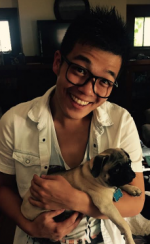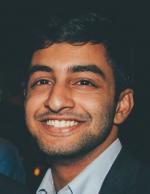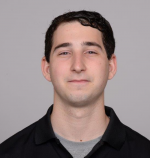Recent Graduates
The most common next steps for Cognitive Science students are postgraduate degrees (PhD, MD, etc.), research jobs in industry, technology jobs (e.g., product designer for Uber), and work at nonprofits (e.g., Teach for America).
Of course, listing the most common next steps does not fully capture the diversity of destinations for Cognitive Science majors. This page includes profiles of recent graduates pursuing a wide variety of post-graduation activities: click on any name for an example!
James Lee (2016, Medical School)
What was your theme within Cognitive Science? What sorts of classes did you take?
My theme was Social Cognition in Non-Verbal Populations. I took courses like Topics in Infant Studies, Habits of Mind, Evolutionary Biology, Mental Lives of Babies and Animals, and Autism and Related Disorders - all of which contributed to my thoughts and studies on how non-verbal individuals think about others.
What sort of research did you do? What was your Senior Thesis about?
I conducted research in Karen Wynn’s Infant Cognition Center and Laurie Santos’ Canine Cognition Center, completing my senior thesis in the latter. My thesis investigated whether dogs prefer an individual who is competent at a treat-retrieving task over an individual who is incompetent at this task. It revealed that perhaps dogs do not develop preferences based on this concept of competence, suggesting that the idea of competence may require more complex social mechanisms.
What are you doing now? How does Cognitive Science relate to it?
I’m currently at Mayo Medical School. All of my research in CogSci at Yale was fueled by my interest in social justice - how do we perceive others who are different from us? How does discrimination begin? How do we immediately categorize other people? In the medical field, I hope to work to create a healthcare field that allows for more inclusion of all races and genders. With my roots in social cognition, I hope to implement programs and curricula in medical schools that increase cultural awareness and respect for different demographics.
Aaditya Tolappa (2016, Teach for America)

Becky Marvin (2016, PhD Computer Science)
What was your theme within Cognitive Science? What sorts of classes did you take?
What sort of research did you do? What was your Senior Thesis about?
My research was in the field of computational linguistics. I used recurrent neural networks (a kind of deep learning algorithm) to create a language model which was then tested on sentences that violated a syntactic property of English, called the that-trace effect. Previously, it was thought that children’s ability to understand such a property was due to the existence of innate grammatical parameters, rather than from their ability to learn from primary linguistic input. My research brought into question the motivation for the existence of these innate parameters by showing that the neural networks (which have no “innate grammatical parameters”) were able to successfully learn the that-trace effect from their primary input.
What are you doing now? How does Cognitive Science relate to it?
Olivia Pavco-Giaccia (2016, CEO of Startup)
What was your theme within Cognitive Science? What sorts of classes did you take?
My theme in Cognitive Science was “Gender and Decision-Making.” I loved the interdisciplinary nature of my courses which included an independent reading course with Professor Maria Trumpler from the Women’s Gender and Sexuality Studies department. As part of that course, I employed the tools of cognitive science to examine concepts from feminist literature. I then further investigated those concepts during an independent research course with Professors Yarrow Dunham (Psychology) and Jason Stanley (Philosophy). I also took several PhD-level courses in decision-making, including Behavioral Decision-Making with Professors Ravi Dahr and Nathan Novemsky in the School of Management.
What sort of research did you do? What was your Senior Thesis about?
My research used the tools of the social sciences to investigate the feminist philosophical premise that ‘reason’ and ‘femaleness’ are culturally at odds with one another, a hypothesis also known as the thinking/feeling gender bias. I found that adults often have robust semantic associations between male and rationality, as well as between female and emotionality. My thesis work is an example of one of my favorite aspects of the Cognitive Science major in that your thesis is self-directed. This incredible opportunity makes it possible to conduct research work on issues important to you in a way that can be transferred into improving the lives of real people.
What are you doing now? How does Cognitive Science relate to it?
I’m CEO of a start-up called LabCandy whose mission is to empower our next generation of female scientists, innovators and inventors by making STEM learning more fun and accessible. Our multi-pronged approach to breaking down gender barriers in STEM includes building public-private partnerships to advance this goal, creating STEM-based content that educates and inspires young girls, and distributing that content across multiple platforms. The core of LabCandy’s initiatives is structured around insights that I gained from the implicit bias testing that composed my thesis research. In the future, I hope to carry out further research in this field and continue transferring its findings into change-making policies and effective, real world interventions.
Daniel Stern (2016, Coaching Analyst for Baltimore Ravens)
What was your theme within Cognitive Science? What sorts of classes did you take?
My theme was “Decision-Making, Strategy, and Persuasion,” which involved classes in behavioral psychology and game theory, as well as economics, data analysis, neuroeconomics, and [outside the major] extensive public speaking and writing. My major was unified by the goals of learning how people and institutions make decisions, how psychological and statistical biases can lead us away from optimal decisions, and how we all might be persuaded [sometimes by hijacking those same biases of ours] to move closer to our best decision-making in various spheres.
What sort of research did you do? What was your Senior Thesis about?
The major gave me an opportunity to get course credit for doing independent research in football strategy: studying both the game and front office decision-making from a game theory standpoint as well as using statistical methods. I also did a lot of research in economic decision-making: for my senior thesis, Shane Frederick (from the School of Management) and I ran a big study on hedging behavior: how do people bet and spread their money across mutually exclusive options with various probabilities of cashing out?
What are you doing now? How does Cognitive Science relate to it?
I work for the coaching staff of the Baltimore Ravens: I do football research projects and analyses assigned to me to try to help us win a championship. My mindset towards strategy is shaped by lessons and tools learned in the major: in short, approach each decision systematically–with humility, curiosity, and rigor–and you can usually find the best option.